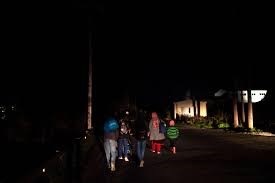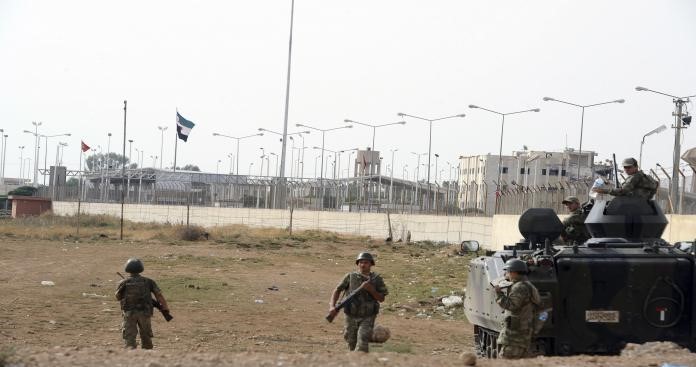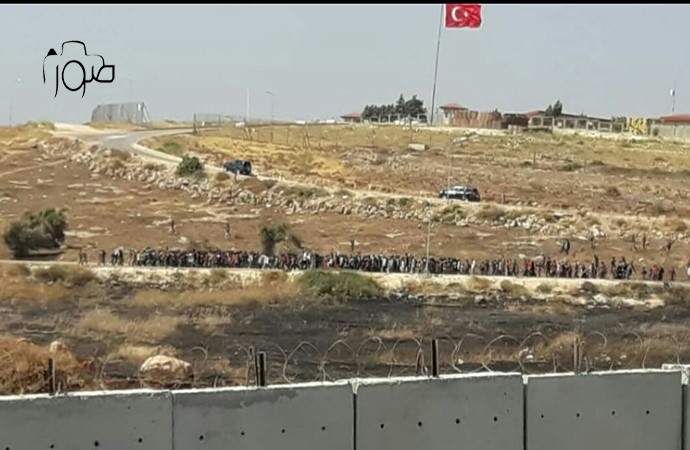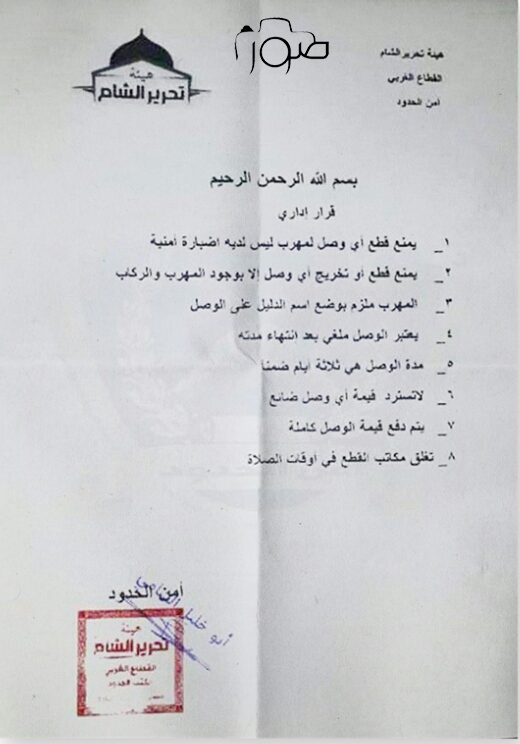Behind the Borders of Blood … Human Smugglers, a Travel Agency or a slavery Market?

Published on: Thursday, March 18, 2021
Behind the Borders of Blood ... Human Smugglers, Travel Agency or slavery Market?
Lamar Arkandy
During the death journeys crossing the border of blood between Syria and Turkey, migrants make their arduous way through the equation of unregulated migration along the borderline that envelops the entire villages of north and northeastern Syria. The adventurers discover the secrets of the border trade and those in charge of that industry, which ends with some of them after crossing the border line as a feast for an international mafia network that shares and exchange them with each other until they end up in the prisons of the Syrian opposition factions loyal to Ankara as criminals accused of being fighters from the Kurdish People's Protection Units, and here greed plays its role, money in exchange for a dose of life that cost dozens of them all they have, or their lives ended with a bullet in The head, according to the version of the survivors, including (Sardar Muhammad), which is a pseudonym for a young man from the city of Qamishli, who had decided to emigrate to Germany and join his family - his wife and two children - and reunited with them after their dispersal for three years. While he was talking to "Swuar" magazine, he didn’t hide his nostalgia and longing for his family, which trying to reach them almost cost him his life, but he turned away from the idea until he guaranteed safe access.
Black destinies
It was the second time that Sardar took a risk with seven other young men who crossed the border through the village of Utbah, east of Qamishli, 15 months ago. Sardar says that they were individuals, and that the smuggler indicated to them to follow the waving lights for them from the Turkish side behind the border.
Sardar and his companions had to go through the climax of adventure, because it was the only window open in front of them, as he says, but: “We have no other choice, as if you are wrapped in strings of death wherever you turn your face. We all set off at nightfall and took the long, boring path full of fear, the most harmed one of us from this long journey was Imad, the thirteen-year-old child, with his lean body and small heart, holding my hand firmly, asking me every time he tightened my hand that I would not abandon him.
"With the advent of dawn, the smuggler called (Abu Jandal) told us as he introduced himself that we will reach the village opposite us on the Turkish side, and follow the lights directly, and call him to send us the second smuggler from the Turkish side, who will host us in his home in the city of Nusaybin, waiting for a safe opportunity for a trip to the city Istanbul, and he told us that the smugglers do not hide their identities, but run to every stranger who offers him their services on travel trips to Europe".
The smuggler who charged each of them the sum of $ 3000, abandoned them as soon as his victims’ feet stepped on the other side of the border. "We arrived to the village in peace, and we did not encounter the Turkish border guards known as the "gendarma", and we called the smuggler who sent us another smuggler, and under the wings of darkness the next day, we were led by an average passenger bus with five young men whom we thought were immigrants like us, after the smuggler delivered the bus to one of the five people whose pointed weapons at our faces, bound our hands and blindfolded us, we were certain that they were armed mercenary from the Syrian factions, especially when one of them laughed at us with the muzzle of his gun pointed at us while he answered his mobile phone, informing the speaker by saying: “The hunting tonight is perfect, we have 8 heads.”
Sardar said that they asked the militants about their direction, they mocked them in the most hideous ways, and told them that they were in Ras al-Ain, then it took them several days to end up in the darkness of a prison in the city of Idlib, which is controlled by Jabhat al-Nusra.
The eight adventurers were severely beaten by the jailers for fifteen days, when a gunman in military uniform and a long white beard called "Abu Qahtan" offered them a deal for the potion of life - as Sardar preferred to call it - which is to call their families and asking for a ransom of 30,000 dollars in exchange for their release.
Sardar says that the process of extortion and bargaining between the gunmen and the families of the victims continued for months, and it was agreed to send the money through money transfer offices in the city of Manbij to Afrin, and whoever did not have the money would be dying, so the father of the thirty-year-old paid the required amount. As for the family of the child Imad, Sardar says, "Bargaining was going on between his family and Abu Qahtan, while the fate of the others remained unknown to me until now".

Sardar was freed in exchange for paying $ 30,000, which guaranteed his return home to go on the journey home from death with a white car that drove rugged mountain roads, then the least rugged until it reached the nearest point in the countryside of Manbij, and was handed over to three civilians who were waiting for him there, and he adds: They took me to Manbij and handed me over to my father, who was waiting for me in the city, and they threatened to kill us if we reported them to the security forces known as Asayish".
More grief for everyone
Questions are hidden about the victims of the wars of big heads, about the basic causes of their tragedy, and about the standards that must be taken from the countries of the rich world that are able and enforceable towards preserving what remains of their humanity, far from these hidden questions, money appears as a basic factor that determines the expected method of smuggling to cross the borders and fall into a net which "Aziz" (29 years old) called "criminal gangs". Aziz, who refused to reveal his second name, added to "Swuar Magazine" that "these smugglers are nothing but a mafia network that does not care about the ultimate fate of its immigrant victims".
About a year and a half ago, Aziz's captors resieved 25 thousand dollars after he entered Iraqi Kurdistan, from which he entered Iran and then to Turkey to be arrested by the Turkish security forces who brought him to the city of Idlib, the center of the extremist militant organizations in Syria, to find himself a prisoner with the Al-Nusra Front, says the twenty-year-old. His family lost hope for his return, and they believed that he was dead, especially since he and the entire population of northeastern Syria were accused of being fighters from the Kurdish People's Protection Units (YPG), whom Turkey and the rest of its loyal militants of the Syrian armed groups consider to be their archenemy.
Aziz indicated that he was returned to Turkey, and from there he returned to Iraqi Kurdistan and settled there, and now he works in the aluminum industry, stressing that his obsession with immigration to Europe stopped with him after months of kidnapping and arrest by the militant factions and with a Turkish green light.
Field execution
For the adventurous immigrants, life seems just a tragic, dark and repetitive scene, a scene that reproduces the same stories and in the same way that may summarize a tragic ending waiting for those on the escape routes towards a normal life for those dreaming to reach the magical lights of Europe. But those rosy fantasies were dispelled and its nightmares followed the dreams of "Maolouda Haji", a young Kurdish woman from the city of Qamishli, after she prepared for the experience of crossing the border from the city of Darbasiyah on the border with Turkey, accompanied by her 14-year-old nephew, but the death of her uncle on the night of her travel delayed her trip and saved her from a field execution, she and her nephew would be its victims.
Maolouda (35 years old) told Swuar magazine that the batch of migrants who crossed the border fence 15 days ago were all killed by bullets from the Turkish army, according to the smuggler who is her brother's friend. He informed her that the group he brought in (15 people) had fallen into the hands of Turkish border guards, who did not hesitate to kill them and carry out a field execution against them, and Suwar magazine could not confirm the authenticity of this information, but reports of international organizations confirm that Turkish border guards have targeted those trying to enter Turkey through the border.
Human Rights Watch confirmed in a report on May 10, 2016 that Turkish border guards randomly shoot Syrian asylum seekers trying to cross into Turkey, and they are collectively returning them to where they came from.

"Although senior Turkish officials claim to receive Syrian refugees with open borders and arms, border guards kill and beat them, it is horrific to shoot at traumatized men, women and children, fleeing fighting and indiscriminate war." said Jerry Simpson, senior researcher in the Refugee Division at Human Rights Watch.
According to the Syrian Observatory for Human Rights, the number of human losses at the hands of Turkish border guards has reached 445 civilian deaths in Syria since 2011: 324 men, 79 children under the age of eighteen, and 42 women over the age of 18, as the killings of Syrians continue on the Turkish Borders While fleeing from the bombing of the Syrian regime.
Smuggling networks are linked to the factions' leaders
Migrants from northeastern Syria take several routes to reach Turkey, and from there to the shores of Istanbul, and to find smugglers to get them to Greece and from there to Europe.
Saeed Mustafa, who previously worked as a smuggler, spoke to Suwar magazine about several methods of smuggling, “Smuggling to the Kurdistan region of Iraq, and from Dohuk to Turkey, and the second route is from Erbil to Sulaymaniyah, then Iran and Turkey”.
And the most dangerous crossing to the Turkish depth after the border villages in the countryside of Qamishli and Darbasiyah to which "Mustafa" refers is through the city of Ras al-Ain, noting that smugglers are hunting those wishing to reach Turkish territory, and seducing them at a price not exceeding $ 100 to kidnap the migrant after his arrival to the city by the militant factions, then blackmailing him and his family to pay huge sums of money, Mustafa confirmed that most of the smuggling networks are linked to the leaders of the Syrian factions, who receive the largest share of the ransom.
Saeed pointed out that smuggling through Manbij, to Jarablus and then to Turkey, is no less dangerous than smuggling from Ras al-Ain, and the majority of migrants fall victim to kidnappers from the armed factions that demand money for life and some of them may be killed even if they pay the ransom.
As for the smuggling route from Manbij to Jarablus, then Azaz, Afrin, or to Idlib, it is supervised by the members and leaders of the Syrian factions, adding that the names of migrants are recorded at checkpoints in addition to the security check, and this method, according to the smuggling expert, is relatively safe, but it is expensive, reaching 1500 dollars each person, and it is intended for the elderly and families.
Mustafa revealed that if the departures are arrested while entering Turkish lands, they are handed over again by the Turkish police to the border crossing controlled by the factions and the administration of the border crossing, which also shares with the smuggler his share of the smuggling sums, then contacts the smuggler to receive the returned migrants.
Smuggling routes price
Each route has its own pricing, which varies between a safe passage or an unsecured adventure. "Saeed Mustafa" offered to Suwar magazine a list of the price of smuggling operations, whose cost per person from Qamishli to the Kurdistan region of Iraq ranges between 800 and 1000 US dollars.
While it reaches 1500 dollars from the city of Dohuk to Turkey, while from the city of Erbil and Sulaymaniyah to Iran, Turkey it reaches 2000 dollars.
From the city of Manbij to Jarablus to Turkey, between $ 1,250 / $ 1,350, but it is $ 1,500 from Manbij, to Azaz, Idlib, and Afrin.
Private sources reported to Suwar magazine that during the past year and a half, 20 cases of kidnapping of migrants by human trafficking networks associated with leaders of Syrian opposition groups have been liberated, in exchange for sums ranging from 20 to 30 thousand dollars.
The sources confirmed the kidnappings of 10 people who arrived in Jarablus several days ago, who were coming from cities and rural areas east of the Euphrates, including a newly married couple, and the kidnappers demanded a ransom of 20 thousand dollars for each person.
the stories of illegal immigrants remain full of tragedies and sorrows, as they are fleeing from the hell of a life they live to another "unknown" hell, and at other times the escape is the end point instead of the starting point, as immigrants and displaced people often appear in the news as numbers. News bulletins' preambles only pay attention to them as subjects of tragic and sad events.
- - - - - - - - - - - -
Between Syria and Turkey ... a wall carries death within it
Ahmed Al-Ahmad
"Between death and life are short moments." With these simple words, a relative of the child Houmam Mustafa Al-Sadeer from the city of Maarat Al-Numan explains the moments of the death of the child, who was less than three years old, during his family's attempt to cross the borders between Syria and Turkey, to encounter a shot issued by the Turkish border guards. The Turkish patrol fired at the car carrying the child Houmam and his family, near the Turkish city of Kilis, during their chasing for it after they crossed the border strip, until a bullet landed in Houmam's chest, killing him and injuring his mother, and was subsequently transferred to the city hospital.
The story of the child Houmam is one of dozens of similar cases of killings by Turkish border guards, where the killing of nearly 420 civilians, including 320 men, 75 children and 25 women, was documented. According to a youth group working to monitor and document killings on the Syrian-Turkish border.
According to the Syrian Observatory for Human Rights, the number of human losses at the hands of Turkish border guards has reached 445 civilian deaths in Syria since 2011: 324 men, 79 children under the age of eighteen, and 42 women over the age of 18, as the killings of Syrians continue on the Turkish Borders While fleeing from the bombing of the Syrian regime.
Human Rights Watch confirmed in a report on May 10, 2016 that Turkish border guards randomly shoot Syrian asylum seekers trying to cross into Turkey, and they are collectively returning them to where they came from.
"Although senior Turkish officials claim to receive Syrian refugees with open borders and arms, border guards kill and beat them, it is horrific to shoot at traumatized men, women and children, fleeing fighting and indiscriminate war." said Jerry Simpson, senior researcher in the Refugee Division at Human Rights Watch.

Wholesale smuggling and exploitation of the civilian situation
With the intensification of military operations in the many regions in northern Syria, due to which people smuggling operations are active along the border strip separating the two countries, with the high cost of crossing to Turkey as a result of the increase in demand, as the transit cost ranges between $ 400 to $ 3500, the price of the crossing changes according to the geographical area, the road to be taken, the ruggedness of the area, and the presence of a permit to cross "an agreement with the Turkish officer in charge of the area". Or entering illegally through the border crossings at Bab al-Hawa or Bab al-Salama crossing, and smuggling operations go through three basic stages, beginning with the smuggler's gathering of civilians wishing to leave in homes near the border area where men are placed in one room and women in another room, this stage may last for several days, during which the immigrants live in difficult and suffocating conditions, as if they were prisoners until the number, which ranges between 10 to 50 people, is completed, after which the smuggler leads the group to the border and sends a guide to accompany them to start the second stage, where "the ultimate suffering and danger lies".
Wisal Ismail, a displaced woman from the southern countryside of Idlib, trying to cross the border, describes to Suwar magazine the second stage of smuggling, saying, "Every time we carry our children, we follow the guide that makes us cross the borders, and we cross distances sometimes by crawling, sometimes running, and we follow all his instructions, until we meet with Turkish police patrols that shoot at us every time".
Most of the smuggling operations fail in the second stage, when the" Gendarma" captures the group, arrests it, and returns it to Syria. Whoever of the groups who succeeds in crossing the border becomes under the custody of the Turkish smuggler, who leads them to one of the border villages in Hatay State, where the third stage begins.
Northern factions are insurance companies for smuggling
The smuggling operations began at the beginning of 2012, and the cost of smuggling per person was approximately 2000 Syrian pounds, and this cost doubled with the increase in the Turkish tightening of the borders and the greed of smugglers who take advantage of the tightening to raise prices, and the exploitation of those fleeing the war.
Instead of controlling the smuggling by the northern factions, the forces in control on the Syrian side of the border, " Hay'at Tahrir al-Sham" faction in front, works on “licensing” smuggling, as Hay'at Tahrir al-Sham, (formerly Jabhat al-Nusra) established in late 2015 what became known as the “Borders Security Office” of the so-called “borders sector” to organize smuggling operations into Turkey along the Syrian-Turkish borders. Whereas Hay'at Tahrir al-Sham claims that the purpose of establishing this office is to regulate smuggling matters and protect civilians from smugglers scattered in the area, and the commission has also intended to organize lists of names of people to pass through these villages, under which the smuggler bears the responsibility of the people with him and is held accountable in the event of any complaint about his work, while his responsibility ends after they exceed the limits, and the smuggler is also held accountable in the absence of the name on the lists.

The procedures followed suggest comfort and organizing on the surface, but what these points are doing is nothing more than imposing taxes on citizens without any protection, as their work in the Syrian territories is limited to holding smugglers accountable in the event of complaints about not entering Turkey or in the event of being robbed. As for the killing by borders guards or the military operations in Turkish territory, neither the security forces nor the smugglers who protect themselves with a financial receipt bear their responsibility.
The border regulation offices are considered a new source of income for Hay'at Tahrir al-Sham, as these offices charge smugglers an amount of $ 25 per person, and their delegate receives another $ 25 under the pretext of joint coordination between smugglers, so that these funds also return to the treasury of HTS, the fact that these delegates receive fixed salaries from HTS, and those offices require women who want to leave Syria to have a mahram (one of her relatives) accompanying her and to cut a receipt that proves the relationship between them so that she is allowed to cross.
These offices also issued a decision prohibiting smuggling operations outside the scope of these offices and imposing penalties on the smugglers up to imprisonment and a large fine, in order to make all smuggling imports go to their safe only, in addition to issuing other laws to regulate their work, including for the smuggler to have a personal file with its security offices.
Scams and fraud against civilians
With the large number of smugglers and the increase in smuggling operations, networks of smugglers are active with the aim of swindling, fraud and stealing civilian property, after they crossed the border so that no responsibility falls on the smuggler who brought them in. Some networks also kidnapped civilians, imprisoned them and demanded a ransom money from their relatives in exchange for their release.
Abdul Qadir Al-Ismail from Idlib countryside tells the author of the report about the kidnapping of his brother, saying, "After we agreed with the smuggler to bring my younger brother into the city of Antakya for an amount of $ 700, my brother crossed the border with the guide after more than 15 attempts, to be surprise by a phone call from my brother’s phone, I thought he was calling me to tell me that they had arrived in Turkey, as it is known with every smuggling operation, but what happened was almost a shock to me, when the Turkish person who was supposed to take them in his car to the city, requested an amount of $ 300 to be transferred to his bank account to release my brother, threatening to kill him and throw him among the bushes if we did not do what he requested.
Wholesale smuggling operations north of Aleppo
The regions of northern Aleppo are not better for human smuggling operations, as the leaders of the pro-Turkey "National Army" control all smuggling routes through the borders or illegal outlets through the border wall, the cost of the smuggling operation in the northern regions of Aleppo ranges between $ 1,200 for traditional routes to $ 3,500 through the Bab al-Salama borders crossing, which is supervised by the leaders of the Levantine Front, the most prominent of whom is called (Abu Ali Sajo), smuggling operations also include different routes where men wishing to enter Turkey wear military uniforms and bring them into Turkey through Free Army vehicles designated to switch guarding shifts in the areas of Tal Abyad and Ras al-Ain (Sere Kaniye) in northeastern Syria, which Turkey controlled during its recent military campaign, this smuggling operation is carried out in agreement with the Turkish officers present at the Bab al-Salama border crossing, at a cost of approximately $ 2,500, to be taken to near the Kilis border camp for Syrian refugees.
With all the killing, scam and fraud, the smuggling of Syrians and the trading of their lives continues without any real control or authority that guarantees their rights and prevents their exploitation, so the desire to cross the Syrian territories remains like a deadly nightmare, only few survive of it.



